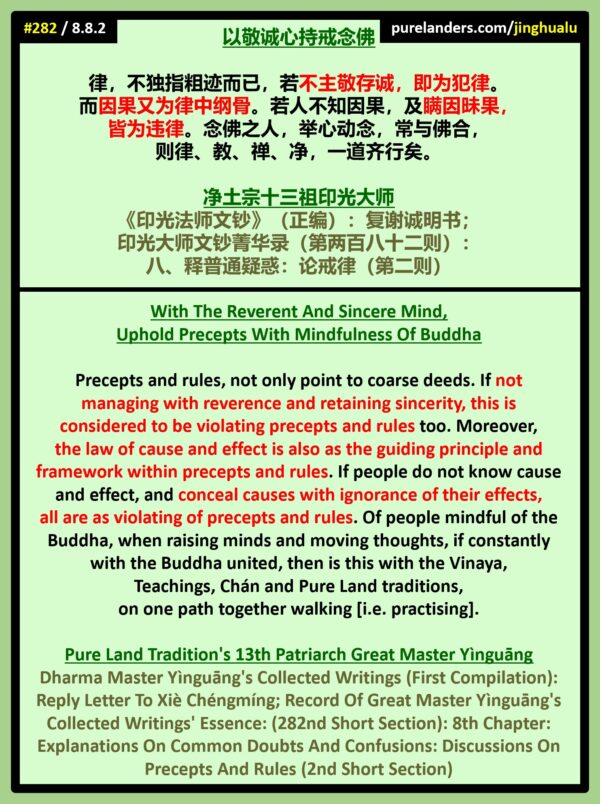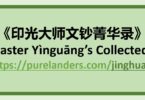以敬诚心,持戒念佛
[282] With [The] Reverent [And] Sincere Mind, Uphold Precepts [With] Mindfulness [Of] Buddha
律,不独指粗迹而已,若不主敬存诚,即为犯律。
[Precepts and] rules, not only point [to] coarse deeds. If not managing [with] reverence [and] retaining sincerity, [this is] considered [to] be violating [precepts and] rules [too].
[Note 1: As precepts and rules (戒律) do not only guide our sometimes superficial words and deeds, also guiding our intentional thoughts that give rise to them, our minds should have respect and sincerity for all beings, who are those the precepts and rules serve to protect.]
而因果又为律中纲骨。若人不知因果,及瞒因昧果,皆为违律。
Moreover, [the law of] cause [and] effect [is] also as [the] guiding principle [and] framework within [precepts and] rules. If people [do] not know cause [and] effect, and conceal causes [with] ignorance [of their] effects, all [are] as violating [of precepts and] rules.
[Note 2: The precepts and rules are structured according to the law of karma (业) (i.e. cause and effect: 因果), so as to avoid creating evil karmas (恶业) that give rise to suffering, and to create good karmas (善业) that give rise to joy. To hide evil karmas created while deluded about their bitter fruits (of suffering) thus goes against the spirit and letter of the precepts and rules.]
念佛之人,举心动念,常与佛合,则律、教、禅、净,一道齐行矣。
Of people mindful [of the] Buddha, [when] raising minds [and] moving thoughts, [if] constantly with [the] Buddha united, then [is this with the] Vinaya, Teachings, Chán [and] Pure Land [traditions, on] one path together walking [i.e. practising].
[Note 3: As those with sincere mindfulness of the Buddha are aligning to their Buddha-nature (佛性) with the Buddha’s blessings, they will naturally and increasingly be aligned to the precepts and rules, that are common in all other Buddhist traditions too, such as those listed. After all, the Vinaya Tradition [律宗] is not the only one connected to observation of precepts and rules.]
[Note 4: Briefly, the Vinaya Tradition (律宗) focuses on strict upholding of the precepts (持戒), to purify the three karmas (三业) of body, speech and mind. The Teachings Tradition (教宗) focuses on studying the sūtras’ teachings (经教), to rely on their teachings to cultivate contemplation (依教修观). The Chán Tradition (禅宗) focuses on Self-powered (自力) meditation (禅修) to see one’s nature (见性). The Pure Land Tradition (净土宗) focuses on the Practice (行) of mindfulness of Buddha (念佛), with profound Faith (深信) and sincere Aspiration (切愿), for reaching his Pure Land, to most swiftly expedite progress to Buddhahood for one and all.]
净土宗十三祖印光大师
Pure Land Tradition’s 13th Patriarch Great Master Yìnguāng
《印光法师文钞》(正编):复谢诚明书;
Dharma Master Yìnguāng’s Collected Writings (First Compilation): Reply Letter [To] Xiè Chéngmíng;
印光大师文钞菁华录(第两百八十二则):八、释普通疑惑:论戒律(第二则)
Record [Of] Great Master Yìnguāng’s Collected Writings’ Essence (282nd Short Section): 8th [Chapter]: Explanations [On] Common Doubts [And] Confusions: Discussions [On] Precepts [And] Rules (2nd Short Section)
[Ref: #282 / 8.8.2]
Namo Amituofo : Translation and notes by Shen Shi’an
下一部分
Next Part:
为何受三皈持五戒?
[283] Why Take The Threefold Refuge And Receive The Five Precepts?
https://purelanders.com/2022/10/28/283-why-take-the-threefold-refuge-and-receive-the-five-precepts
上一部分
Previous Part:
佛之两句略戒
[281] The Buddha’s Two Lines As Brief Precepts
https://purelanders.com/2022/11/03/281-the-buddhas-two-lines-as-brief-precepts
完整典籍
Complete Text:
《印光大师文钞菁华录》
Record Of Great Master Yìnguāng’s Collected Writings’ Essence
https://purelanders.com/jinghualu






